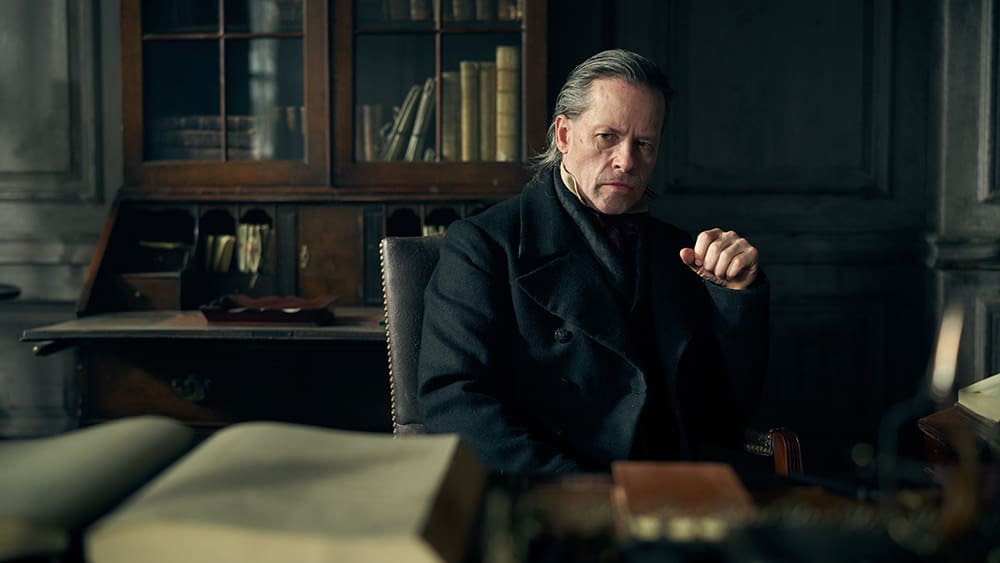
Photo Credit: Robert Viglasky/FX
A Christmas Carol is a story that’s been to death. We’ve seen it in black and white, with Muppets, we’ve seen it Disney-fied (twice) and the story adapted to the plot of television shows ranging from classic sitcoms to Doctor Who.
So that’s what makes FX’s A Christmas Carol — which will air on BBC One this week — so wildly impressive. Not only have executive producer Tom Hardy, and writer Steven Knight (who penned the Hardy starring FX vehicle Taboo, as well as Peaky Blinders) have they found new and interesting ways to freshen up the Dickens classic, but they’ve found a new way of exploring its main character, Ebenezer Scrooge.
Now, before we extol the virtues of this adaptation — let’s get the humbug out of the way first. If you’re watching this on FX, this is a very long watch — we’re talking three hours plus with commercials. The film, after its throat-grabbing introduction, grinds to a slow, miserable plodding pace that you could easily find yourself wanting to bail on. If you’re familiar with Knight’s work, particularly on Taboo (one of the wildest and darkest shows of the last decade), you know this will not be even a remote happily story. His version of A Christmas Carol is unflinching in its presentation of violence, death, trauma, and sexual assault.
If this does not sound like the type of fare you want to consuming during the holidays, it’s absolutely understandable. This is a tough watch, and for those justifiably looking for something with more of a warm Christmas heart to it, especially since 2019 has been kind of a dumpster fire of a year, I would not blame you one iota for skipping this one.
However, this unflinching approach to the tale of Scrooge is what this story needs. To do another version of A Christmas Carol with Scrooge goofily running through the streets of London wishing everyone a Merry Christmas, and ending up being the best “uncle” to Tiny Tim and living his life out as a newly christened and forgiven good guy would’ve probably rung hollow. We’ve seen this version all too often.
Instead, what this version does is explore two things — trauma (that Scrooge has both experienced and inflicted), and the idea of forgiveness, in particular does Scrooge deserve to be forgiven? These new ideas allow expound on the whole “Scrooge is obsessed with money which has lead him to become a miserable old miser” concept, and makes him more of a realistic character. We see his obsession with money is being used to fill the massive void in his soul left by his childhood trauma, and that he uses that trauma in many ways to excuse his behavior which has lead to hundreds of deaths as well as heartbreak, poverty and despair.
While Scrooge still is a symbol for man’s obsession with wealth, even at the cost of other’s lives, seeing the horrific events unfold on screen makes his character that much more despicable, and his eventual redemption arc (yeah I’m not ruining anything here the book’s a couple hundred years old) that much more earned. And it’s earned in a way that’s not all hot chocolate and “God Bless Everyone” either. It’s more realistic, much more human, and creative that in the versions we’ve seen through the years.
Guy Pearce delivers one of his best performances in years as Ebenezer Scrooge. He imbues a realism into Scrooge — he’s not just a bah humbug caricature here. Pearce delivers a complex performance as you can see his internal conflict being raged physically manifesting itself across his face and body. It’s also stunning to watch him in essence play two characters in scenes.
The most impactful of these scenes is during when Scrooge heinously demeans Mary Cratchit (Vinette Robinson who nearly steals the entire adaptation) sexually, emotionally and mentally for his own pleasure. It’s God damn disgusting to watch and Pearce’s sneering, vicious, vile performance “in the past” and his guilt-riddled performance in “the present” combined Robinson’s brilliance, make this scene unforgettable.
Pearce’s best work, as expected, comes in the last half of the series particularly in his scenes with The Ghost of Christmas Past (Riley), and a final scene with Marley (the always excellent Stephen Graham) where he begins to realize his sins, and comes up with a rather unexpected conclusion about his life.
FX’s A Christmas Carol does so much right for the source material. It introduces new wrinkles to time-honored characters, it injects tense and terrifying moments of horror (both supernatural and realistic), it adds to and modifies the original plot, and somehow makes the source material more believable and more relatable for 2019. Again, this is a very dark, tough watch that is not for mass consumption. However, it’s still a very creative, and very well-done adaptation that is worth the epic time run.
A Christmas Carol will air as a mini-series in the U.K., and is currently streaming on the FX website.

